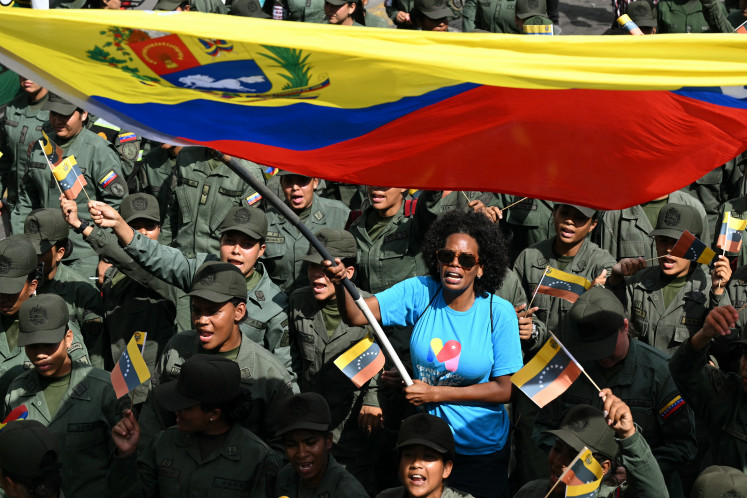Popular Reads
Top Results
Can't find what you're looking for?
View all search resultsPopular Reads
Top Results
Can't find what you're looking for?
View all search resultsWhy the world must resist, prevent neocolonial policies
Countries must establish a completely new system of international relations based on the principles of respect and well-wishing non-interference.
Change text size
Gift Premium Articles
to Anyone
I
t is notorious that violent exploitation of other civilizations in the form of colonialism and that slavery played a fundamental role in the enrichment of the West and maintaining its dominance. Though former metropoles may deny it, these dark pages are etched indelibly in history.
Today, the West, headed by the United States, while implementing neocolonial practices seeks to hamper the natural development of global processes, keep an unbalanced model of the global economy, eliminate competitors in the military-political and economic fields as well as retain its elusive dominance. The West is trying to replace the emerging multipolar world architecture with a “rules-based world order” that in fact is an updated version of colonialism.
The concept “neocolonialism” has been current since the mid-20th century and is used in relation to the policy of the former metropoles aimed at restraining development of young nations that have barely gained formal independence, as well as at compensating those territorial and material losses that the metropoles suffered as a result of decolonization.
Neo-metropolitan powers target their disruptive efforts to control the natural wealth of developing countries. According to some calculations, the West drained over US$62 trillion worth of raw materials from Global South countries between 1960 and 2018. To pursue these goals the Western countries induce developing countries to borrow at overcharged interest rates.
According to the United Nations Global Crisis Response Group on Food, Energy and Finance, countries in Asia and Oceania borrow at an average rate of 6.5 percent, Latin America and the Caribbean at 7.7 percent and Africa at 11.6 percent. At the same time, borrowing costs for the US stand at 3.1 percent and for Germany 1.5 percent.
The practice of coup d’etat and military interventions is widely used. Some experts claim that the US interfered in elections in other countries more than 80 times between 1946 and 2000. Sanctions are also imposed. Out of 174 cases of restrictive measures applied in the 20th century, the US was responsible for 109.
While pretending to care about the environment, rich states force countries across the Global South to adopt regulations on “preserving environment” that disregard national interests. In practice, they promote “climate neocolonialism”.
Even while offering humanitarian assistance projects, the West primarily cherishes its own interests. Food-deprived states in Africa and Asia received only 3 percent out of the total 32.8 million tonnes under the Black Sea Initiative on the distribution of Ukrainian grain.
Neocolonial views of the representatives of the so-called “golden billion” can be clearly seen via their statements. For instance, Josep Borrell, the European Union High Representative for Foreign Affairs and Security Policy, said “Europe is a garden, whereas the rest of the world is a jungle”.
Another illustrative example is the serious debate in the Netherlands on whether to withdraw the official apologies regarding the war crimes committed by the Dutch against the Indonesians during the independence war in 1945-1949.
Without any doubt, coordination of the approaches of the world majority countries is necessary to establish a completely new system of international relations based on the principles of respect and well-wishing non-interference.
On June 17-18, the first meeting of the Permanent Committee of the Antineocolonial Movement for the Freedom of Nations was held in Vladivostok, Russia.
In his opening remarks, Russian Foreign Minister Sergey Lavrov said new power centers, including the BRICS, the leaders of the African Union, ASEAN, SELAC and other integration unions of the global majority, played a key role in its context. He added that it was necessary to work toward strengthening their positions in the international institutions, primarily the UN Security Council and Group of 20, especially after the African Union’s accession to the group.
By joining the final declaration, Russia and more than 150 representatives of leading political parties and public organizations from 32 countries, including Indonesia, emphasized their commitment to build a just and multipolar world based on the purposes and principles enshrined in the UN Charter.
The selective implementation of universal norms of international law and the use of unilaterally imposed illegal restrictive measures to evade the UN Charter were condemned.
The participants in the forum declared their desire to expand cooperation among the countries of the world majority in order to counter mechanisms of political and economic blackmail and restrictions on the sovereign equality of states.
They noted the unacceptability of imposing on the world majority certain norms in the elaboration of which the equal participation of all interested states has not been ensured, as well as the vicious system of double standards and the deliberate politicization of issues related to the observance of human rights and the development of democracy.
Various forms of falsification of history aimed at achieving certain geopolitical goals, attempts to consign crimes of the colonial era to oblivion as well as the deliberate dissemination by metropoles of false, untrue, misleading and socially dangerous information regarding the era of colonial conquests were denounced.
I am convinced that the very movements that unite progressive political forces of Eurasia, Africa and Latin America can make a significant contribution to forming a fair and polycentric world order by genuine democratization of the established mechanisms of global governance, implementation of the principles of inclusive multilateralism, sovereign equality, non-interference, peaceful coexistence between countries with different political and social systems, mutual understanding and respect.
The aim is to build a bright future for the whole international community and prevent the revival of neocolonial practices.
***
The writer is Russian ambassador to Indonesia.











